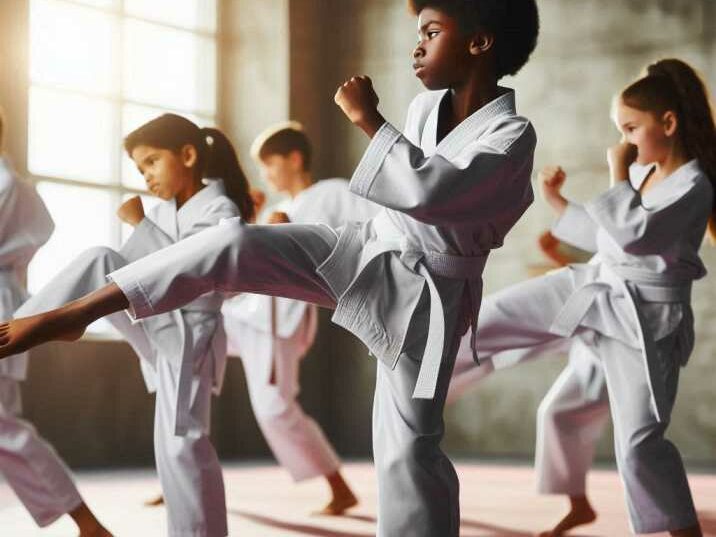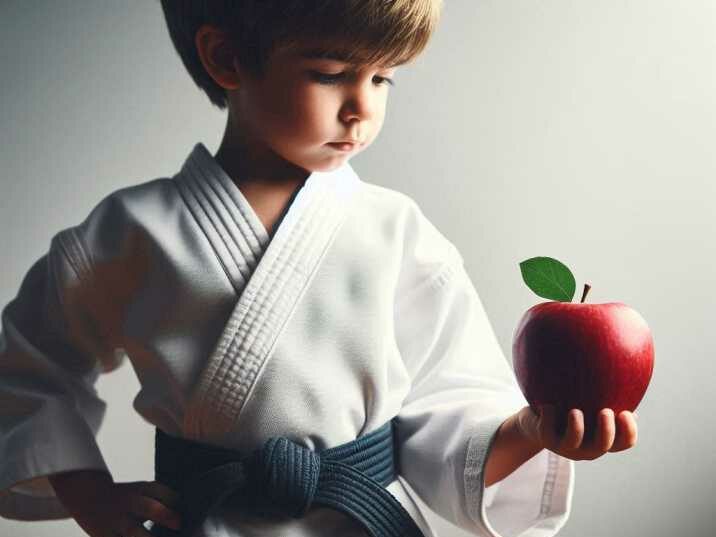Introduction:
Table of Contents
Ensuring our children stay healthy is a top priority for parents. With the increasing importance of maintaining a strong immune system, finding effective ways to enhance it becomes crucial. One such powerful method is regular exercise through martial arts. This article explores how martial arts can significantly strengthen your child’s immune system, helping them fend off illnesses and stay healthy.

Understanding the Immune System
What is the Immune System?
The immune system is a complex network of cells, tissues, and organs working together to defend the body against harmful invaders such as bacteria, viruses, and other pathogens. It includes components like white blood cells, antibodies, and the lymphatic system. Each part plays a crucial role in identifying and neutralizing threats to keep the body healthy.
How Does It Protect the Body?
The immune system protects the body through several mechanisms:
- Physical Barriers: Skin and mucous membranes act as the first line of defense against pathogens.
- Innate Immunity: This non-specific defense mechanism involves cells and proteins that respond quickly to pathogens.
- Adaptive Immunity: This system develops a targeted response against specific pathogens, creating memory cells for faster response in future encounters.
Why is It Important to Keep the Immune System Strong?
Maintaining a strong immune system is essential for overall health. It helps the body quickly and effectively respond to infections, reducing the severity and duration of illnesses. For children, a robust immune system supports their growth and development, allowing them to stay active and thrive. A strong immune system also helps in preventing chronic diseases and promotes longevity.
Benefits of Regular Exercise for Children
Importance of Physical Activity for Kids
Physical activity is crucial for children’s physical, mental, and emotional development. It promotes healthy growth, improves cardiovascular health, and helps maintain a healthy weight. Regular exercise also enhances mood, reduces anxiety, and improves sleep patterns. Active children are more likely to have better academic performance and social skills.
How Exercise Boosts Immunity?
Engaging in regular physical activity can boost the immune system in several ways:
- Improved Circulation: Exercise enhances blood flow, which helps immune cells move more efficiently throughout the body.
- Increased Production of Immune Cells: Physical activity stimulates the production of white blood cells and antibodies.
- Reduced Inflammation: Regular exercise can lower chronic inflammation, which supports overall immune function.
- Enhanced Lymphatic Function: Exercise stimulates the lymphatic system, which plays a key role in transporting and filtering immune cells.
- Stress Hormone Regulation: Physical activity helps in balancing stress hormones like cortisol, which can suppress the immune response when chronically elevated.
Role of Martial Arts in Promoting Overall Health
Martial arts, a structured form of physical activity, offers numerous health benefits:
- Cardiovascular Fitness: Martial arts training involves aerobic exercises that improve heart health.
- Strength and Flexibility: The practice includes various movements that enhance muscle strength and flexibility.
- Mental Discipline: Martial arts promote mental focus, self-discipline, and stress relief, which are essential for overall well-being.
- Coordination and Balance: The techniques in martial arts improve motor skills, coordination, and balance.
- Social Interaction: Group classes foster teamwork, communication skills, and the ability to work well with others.
Exploring Martial Arts
Introduction to Martial Arts
Martial arts are ancient practices that combine physical exercise, self-defense techniques, and mental discipline. They originated in different cultures, each with unique styles and philosophies. Martial arts training is not only about fighting but also about achieving balance and harmony in life.
Types of Martial Arts Suitable for Children
There are several martial arts disciplines that are suitable and safe for children:
- Karate: Focuses on striking techniques using punches, kicks, and knee strikes.
- Taekwondo: Emphasizes high kicks, jumping and spinning kicks, and fast hand techniques.
- Judo: Concentrates on throws, grappling, and submission holds.
- Brazilian Jiu-Jitsu: Focuses on ground fighting and submission techniques.
- Kung Fu: Encompasses various Chinese martial arts styles that involve fluid movements and traditional forms.
- Aikido: Focuses on using an opponent’s energy against them, promoting joint locks and throws.
Benefits Beyond Physical Fitness
Martial arts offer numerous benefits that extend beyond physical fitness:
- Self-Discipline: Practicing martial arts teaches children to set goals, work hard, and persist in the face of challenges.
- Confidence: As children learn and master new skills, their self-esteem and confidence grow.
- Respect and Social Skills: Martial arts instill values like respect for others, teamwork, and good sportsmanship.
- Conflict Resolution: Children learn non-violent ways to resolve conflicts and the importance of self-control.
- Focus and Concentration: Martial arts require focus, improving attention spans and cognitive function.
Martial Arts and Immunity
How Martial Arts Impact the Immune System
Martial arts practice enhances the immune system through several mechanisms:
- Stress Reduction: Martial arts help reduce stress levels, which can otherwise weaken the immune system.
- Improved Sleep: Regular training promotes better sleep, which is crucial for maintaining a healthy immune system.
- Healthy Lifestyle: Martial arts encourage a balanced lifestyle that includes proper nutrition and hydration, supporting overall immune health.
- Community Support: Being part of a martial arts community provides social support, which can improve mental health and, consequently, immune function.
- Mindfulness and Meditation: Many martial arts include mindfulness practices, which help in reducing stress and enhancing immune response.
Research and Studies Supporting the Link
Numerous studies have shown the positive impact of martial arts on the immune system:
- Increased White Blood Cell Count: Research indicates that martial arts training can lead to an increase in white blood cells, which are vital for immune response.
- Enhanced Immune Function: Studies have demonstrated that regular martial arts practice enhances the body’s ability to fight infections and diseases.
- Reduced Inflammation: Martial arts training can lower levels of chronic inflammation, contributing to better immune health.
- Psychological Benefits: Research shows that martial arts reduce symptoms of anxiety and depression, which are linked to immune health.

Specific Immune-Boosting Effects of Martial Arts
- Cardiovascular Health: Martial arts improve cardiovascular fitness, which supports efficient circulation of immune cells.
- Mental Health Benefits: Reduced stress and anxiety through martial arts enhance overall immune function.
- Physical Fitness: Improved strength, flexibility, and endurance from martial arts training contribute to a well-functioning immune system.
- Hormonal Balance: Exercise helps regulate hormones that are crucial for immune function, such as growth hormone and endorphins.
- Gut Health: Physical activity can improve gut health, which is closely linked to the immune system.
Tips for Introducing Martial Arts to Kids
Finding the Right Martial Arts Class
Choosing the right martial arts class for your child involves several considerations:
- Research Local Schools: Look for reputable martial arts schools with experienced instructors.
- Visit Classes: Observe classes to ensure the environment is safe and supportive.
- Check Instructor Credentials: Ensure instructors are qualified and have experience working with children.
- Class Size: Smaller class sizes ensure more individual attention and instruction for your child.
- Trial Classes: Many schools offer trial classes to see if the style and environment are a good fit for your child.
Safety Considerations
Ensuring your child’s safety during martial arts practice is paramount:
- Proper Equipment: Ensure your child uses appropriate protective gear such as mouthguards, headgear, and pads.
- Supervision: Classes should be supervised by qualified instructors who prioritize safety.
- Warm-Up and Cool-Down: Proper warm-up and cool-down exercises are essential to prevent injuries.
- Health Check: Make sure your child is in good health before starting any new physical activity.
- Parental Involvement: Stay involved and communicate with instructors to monitor your child’s progress and safety.
Encouraging Consistency and Discipline
To maximize the benefits of martial arts, encourage your child to attend classes regularly:
- Set a Routine: Establish a consistent schedule for martial arts practice.
- Support and Encourage: Show interest in their progress and celebrate their achievements.
- Promote Balance: Ensure your child balances martial arts with other activities and rest.
- Goal Setting: Help your child set achievable goals in their martial arts journey.
- Positive Reinforcement: Use positive reinforcement to motivate and encourage continuous improvement.
able of Information: Benefits of Martial Arts for Children’s Immune Systems
| Aspect | Description |
|---|---|
| Physical Fitness | Martial arts training improves cardiovascular health, strength, flexibility, and endurance. |
| Immune System Support | Regular practice enhances the immune system by increasing white blood cell production. |
| Stress Reduction | Martial arts reduce stress levels through physical activity and mindfulness techniques. |
| Improved Sleep | Consistent training promotes better sleep quality, essential for immune function. |
| Self-Discipline | Children learn goal-setting, perseverance, and self-control, which benefit overall health. |
| Confidence Building | Achieving new skills and overcoming challenges boosts self-esteem and confidence. |
| Social Interaction | Group classes foster teamwork, communication skills, and a sense of community. |
| Emotional Well-being | Martial arts provide an outlet for emotional expression and stress relief. |
| Cognitive Development | Focus, concentration, and problem-solving skills improve through martial arts practice. |
| Balanced Lifestyle | Training encourages healthy habits such as proper nutrition and hydration. |
Conclusion:
In conclusion, martial arts offer more than just physical fitness—they provide a holistic approach to health and well-being for children. By incorporating martial arts into your child’s routine, you can strengthen their immune system, boost their confidence, and instill valuable life skills. Start your child’s martial arts journey today and empower them to lead a healthy and fulfilling life.
FAQs (Frequently Asked Questions):
What is martial arts?
Martial arts are traditional combat practices that focus on mental and physical discipline.
How does martial arts boost the immune system?
Regular martial arts practice strengthens the immune system by increasing the production of white blood cells and antibodies.
Can children of all ages participate in martial arts?
Yes, there are martial arts programs tailored for children as young as four years old.
Are there any safety concerns associated with martial arts for kids?
Proper supervision and adherence to safety guidelines minimize the risk of injury in martial arts classes for children.
How often should kids practice martial arts to see immune-boosting benefits?
Consistent practice, ideally a few times a week, is recommended to experience the full benefits of martial arts on immunity.
What age is appropriate for children to start martial arts training?
Martial arts classes are typically available for children as young as three or four years old. However, the suitable starting age may vary depending on the child’s maturity level and physical development. It’s essential to choose a program that offers age-appropriate instruction and emphasizes safety and fun.


